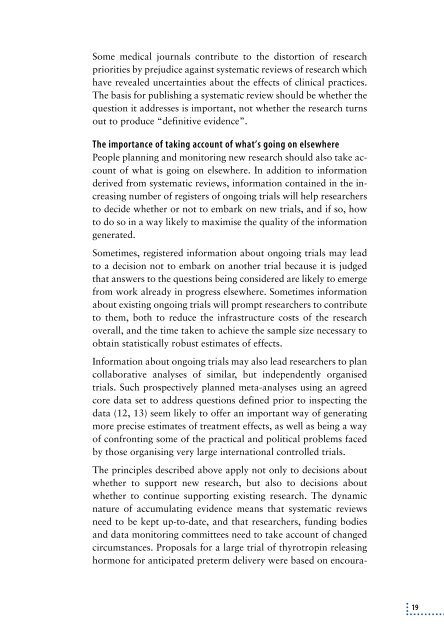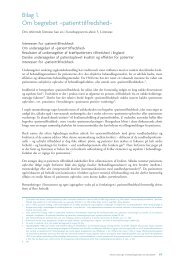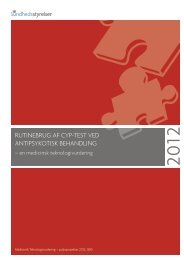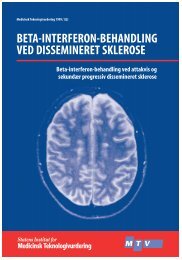MTV, sundhedstjenesteforskning og klinisk praksis
MTV, sundhedstjenesteforskning og klinisk praksis
MTV, sundhedstjenesteforskning og klinisk praksis
You also want an ePaper? Increase the reach of your titles
YUMPU automatically turns print PDFs into web optimized ePapers that Google loves.
Some medical journals contribute to the distortion of research<br />
priorities by prejudice against systematic reviews of research which<br />
have revealed uncertainties about the effects of clinical practices.<br />
The basis for publishing a systematic review should be whether the<br />
question it addresses is important, not whether the research turns<br />
out to produce “definitive evidence”.<br />
The importance of taking account of what’s going on elsewhere<br />
People planning and monitoring new research should also take account<br />
of what is going on elsewhere. In addition to information<br />
derived from systematic reviews, information contained in the increasing<br />
number of registers of ongoing trials will help researchers<br />
to decide whether or not to embark on new trials, and if so, how<br />
to do so in a way likely to maximise the quality of the information<br />
generated.<br />
Sometimes, registered information about ongoing trials may lead<br />
to a decision not to embark on another trial because it is judged<br />
that answers to the questions being considered are likely to emerge<br />
from work already in pr<strong>og</strong>ress elsewhere. Sometimes information<br />
about existing ongoing trials will prompt researchers to contribute<br />
to them, both to reduce the infrastructure costs of the research<br />
overall, and the time taken to achieve the sample size necessary to<br />
obtain statistically robust estimates of effects.<br />
Information about ongoing trials may also lead researchers to plan<br />
collaborative analyses of similar, but independently organised<br />
trials. Such prospectively planned meta-analyses using an agreed<br />
core data set to address questions defined prior to inspecting the<br />
data (12, 13) seem likely to offer an important way of generating<br />
more precise estimates of treatment effects, as well as being a way<br />
of confronting some of the practical and political problems faced<br />
by those organising very large international controlled trials.<br />
The principles described above apply not only to decisions about<br />
whether to support new research, but also to decisions about<br />
whether to continue supporting existing research. The dynamic<br />
nature of accumulating evidence means that systematic reviews<br />
need to be kept up-to-date, and that researchers, funding bodies<br />
and data monitoring committees need to take account of changed<br />
circumstances. Proposals for a large trial of thyrotropin releasing<br />
hormone for anticipated preterm delivery were based on encoura-<br />
19

















